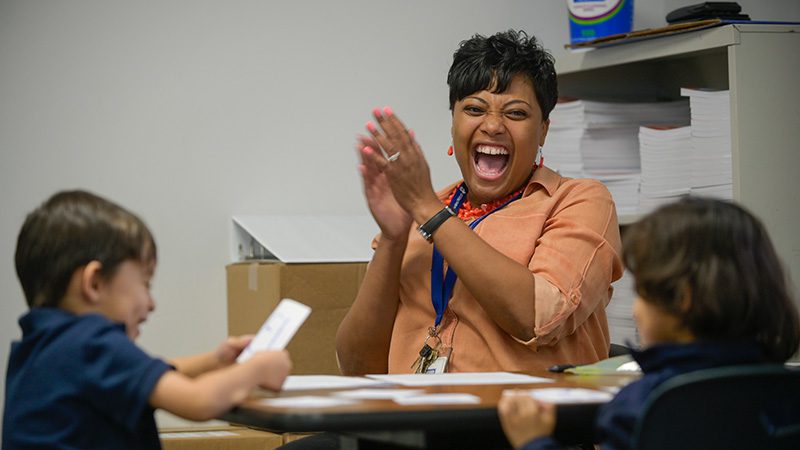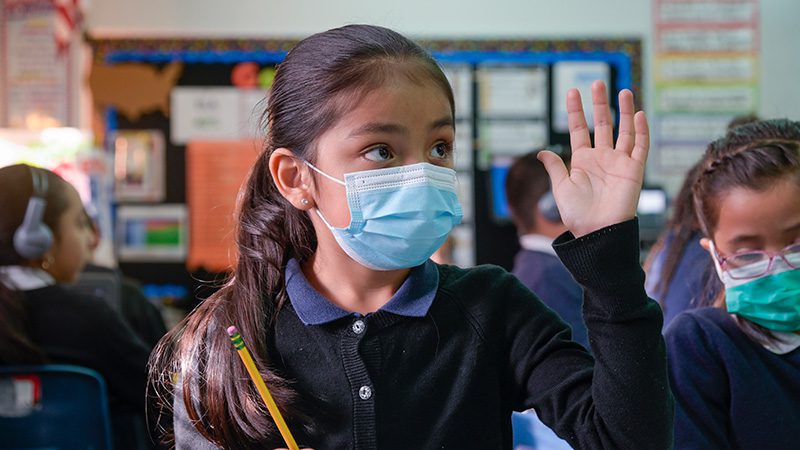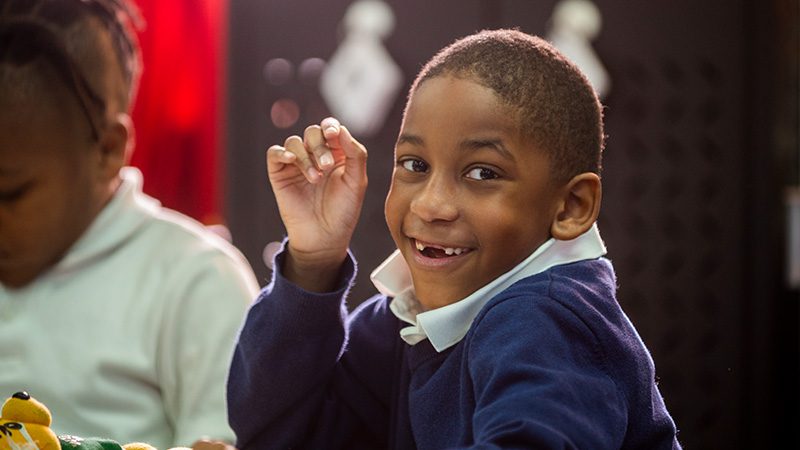Walton Charter Academy
Parent Involvement Adds Essential Ingredient to Success at Pontiac’s Walton Charter Academy
By Cassandra Spratling
A festive lilac and purple wall of flowers, butterflies, balloons and other decorations took center stage in the main entrance way of Walton Charter Academy in Pontiac. Students and staff created the charming display that served as a backdrop for hundreds of photos taken on Parent Appreciation Day. Expressions of gratitude emblazoned the display, written in both Spanish and English. The teachers and students also transformed the usually staid teacher’s lounge into an elegant English garden where parents were served brunch catered by a local, family-owned restaurant.
The annual day celebrating parents is Walton’s way of showing gratitude for the critical role parents play in the life of the school that serves 800 students in grades K-8. A majority of those students are students of color and come from low-income households. About 55 percent of the students are Latino, and 33 percent of the students are English Learners.
Education Trust-Midwest researchers took note of Walton because over a three-year period (2017 to 2019) its Latino students showed above-average growth in both math and English Language Arts. The same was true for its English Learner population.
Several factors that contributed to the commendable growth are frequent progress monitoring, small-group instruction, focused English Language instruction for those who need it, strong leadership and a steadfast belief that every child can succeed academically and behaviorally, according to research and interviews with school leaders, teachers and others associated with the school.
Undergirding it all is parent support. The school makes a concerted effort to ensure parents feel welcome and appreciated. All communication, whether by telephone, social media or print, is available in Spanish to make sure parents can engage in children’s learning. Translators are available at parent-teacher conferences, if the teacher isn’t bilingual.
Parents even have their own room at the school, though they can often be found all over the building—laminating reports, ironing graduation gowns, decorating bulletin boards, popping popcorn, assisting with supervision on the playground, and cooking and sharing ethnic dishes that reflect the culture of the predominantly Latino parent group.
I work very vigilantly and diligently to make sure that [the parents] know that whatever we’ve done for them is truly out of love for them … I don’t think that they really recognize the value that they bring into this school, to us, on a social level. We hear them sing, we hear them laugh, and we get pulled into all of that. So not only are they a part of our family, they’ve pulled us in into theirs.”
School Office Administrator

“We just want to show them how much we care about them and appreciate everything they do for our staff and our students as a whole, not just the ones that they bring to and from school every day,” said principal Mona Boersma, who has been at the helm of the school eight of her 23 years at Walton. She began as a teacher.
Supporting and encouraging parent involvement is key to their strategy for success. “Because if parents are comfortable, we are able to build a true partnership with them so that together we can support each and every child to be successful,” Boersma said.
The school also offers workshops and other programs aimed at helping parents feel more competent and confident in themselves, not only to be empowered at the school, but in their daily lives. Recently, for example, the school held a workshop on budgeting and finance for parents. “We support families not only in how to better support their children to academic success, but making the families feel more confident just as people in the community,” Boersma said.
This year’s parent volunteers celebration was orchestrated by school office administrator Jennifer Kreger.
“I work very vigilantly and diligently to make sure that they know that whatever we’ve done for them is truly out of love for them,” Kreger says. “I don’t think that they really recognize the value that they bring into this school, to us, on a social level. We hear them sing, we hear them laugh, and we get pulled into all of that. So not only are they a part of our family, they’ve pulled us in into theirs,” Kreger says.
One of those regulars is Cristina Roque, whose 11-year-old twins, Stephanie and Christopher Roque, are 6th graders this fall. Roque, who isn’t fluent in English, says she appreciates that information is always sent home in Spanish, so the school is sure she can understand it. When she attends parent conferences, a translator is there.
One of the bonuses, she says, is that while her children are formally learning Spanish, their non-Spanish-speaking classmates are picking up Spanish informally. She recalls being pleasantly surprised when speaking Spanish in the lunchroom, and several students told her they understood her.
Roque says she and her children love the school because the school seeks to make them better people as well as better-educated students. She noted the school has a monthly focus on a different value or principle, such as gratitude, compassion and courage.
“The school is like a second home,” she said through translator Merlyn Parra, who works as a parent-student liaison and is a former Walton parent herself. “Here in the school, the secretaries, all the staff always respect us.”
Second-grade teacher Stephanie Figueroa says the welcoming environment helps student achievement. “Just them feeling welcome, feeling safe, a safe environment. I feel like they are happy every morning they walk in,” she says.


Data-Driven Instruction
Progress monitoring is also essential for all students, and all students who need extra help receive it, either in small groups in the classroom or outside the classroom.
Each student has a weekly goal in math and English Language Arts. The goals are based on state standards, and teachers make sure each student knows the standard or goal students are working to master. Students are tested weekly on their mastery of their weekly goal. Parents receive weekly reports on the student’s progress.
Teachers then analyze the data at least weekly in tandem with other grade-level teachers and a dean to determine if skills need to be re-taught to particular students. Extra assistance takes different forms, depending on the assessment. It could be small group instruction, one-on-one assistance from an English Language teacher in the classroom or one-on-one virtual tutoring with a high school student.
Any student who desires it can also take advantage of after-school tutoring offered by one of the school’s community partners, The Center for Success, an organization that offers various services to help children and families thrive. Future teachers from nearby Oakland University also provide one-on-one tutoring.
Focus On English Learners
In addition to monitoring in math and English Language Arts, English Learners are regularly tested on their proficiency with English. Depending on their proficiency, they are pulled out on a regular basis to work in small groups with other English Learners — or an English Language specialist comes into the classroom to help make sure those students are comprehending what is being taught.
The entire instructional staff went through a program aimed at helping them become better teachers of English Learners. The program, called SIOP, stands for Sheltered Instruction Observation Protocol. Teachers learn to incorporate a lot of visuals, discussion and explanation and teaching of vocabulary in their instructional methodology, Boersma said. Most importantly, while it was designed to assist English Learners, it’s beneficial for all students, she said. “(They’re) just really good instructional practices for every student,” she said.
It no doubt helps that the school is led by someone well-versed in teaching English Learners. Boersma went back to school to become certified in teaching English Learners and served for five years as EL coordinator at Walton.
Staffed For Success
Walton’s strong academic support team also buttresses its success.
In each K-2 classroom, there’s a teacher and a paraprofessional which makes small-group instruction easier. There’s also a paraprofessional in two of the three classrooms of third, fourth and fifth graders. Paraprofessionals work in classrooms with the greatest need to fill in gaps in achievement.
In addition, the school has a writing coach, reading coach and a math coach who work directly with teachers helping them hone their instruction and, sometimes working with students in small groups.
As importantly, the school has three EL teachers who work wherever needed throughout the school, in the classroom or pulling small groups or individual students to instruction.
Two staff people serve as student-family liaisons to help ensure parents feel comfortable, competent and confident in dealings with the school.
Bilingual staff members not only help English-learning parents and students communicate, but they also serve as role models for success.
“[Just being] Hispanic myself, I knew the struggles that a lot of them are facing right now when it came to knowing two languages and trying to read, and I feel like I could connect with the struggles that they had, and help them learn that way, how to read,” Figueroa said.
Boersma says she’s especially proud of the fact that she’s seeing many former students bringing their own children to Walton. “We are a school of choice and I’m always amazed and always impressed and thankful and grateful to parents for choosing us,” she said. “And they don’t just get academics, right? They get cared for.”